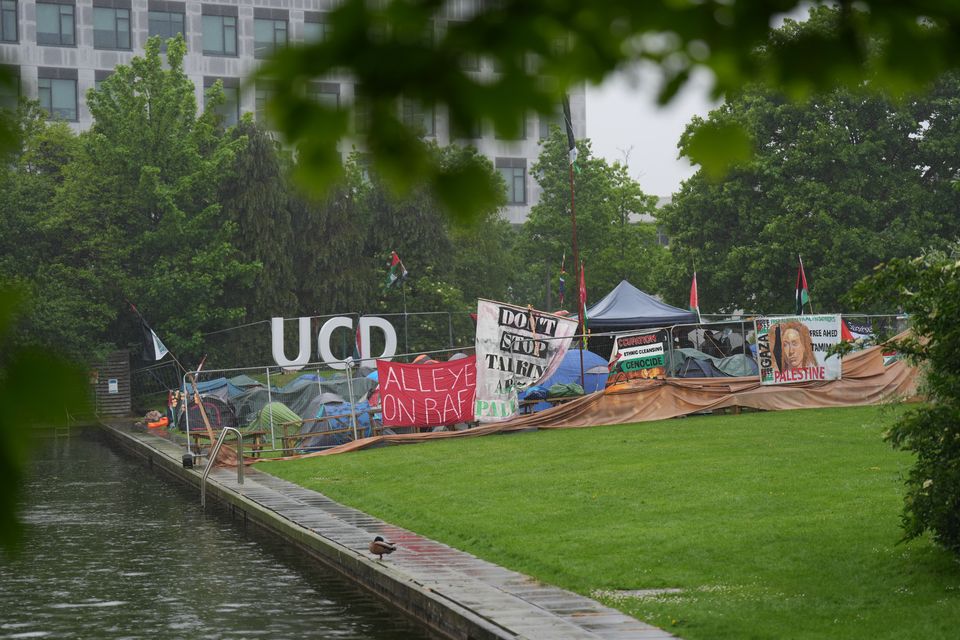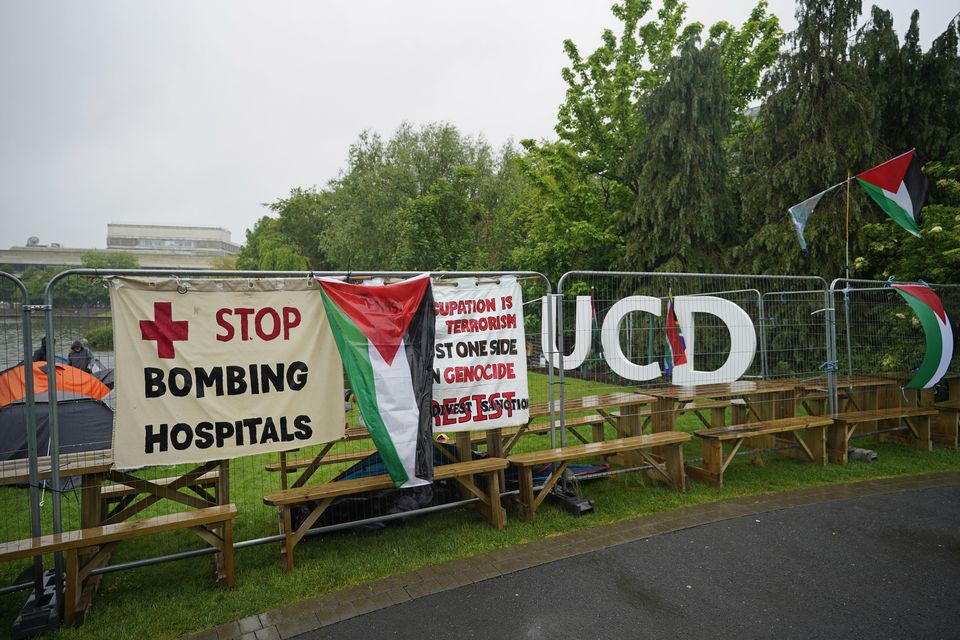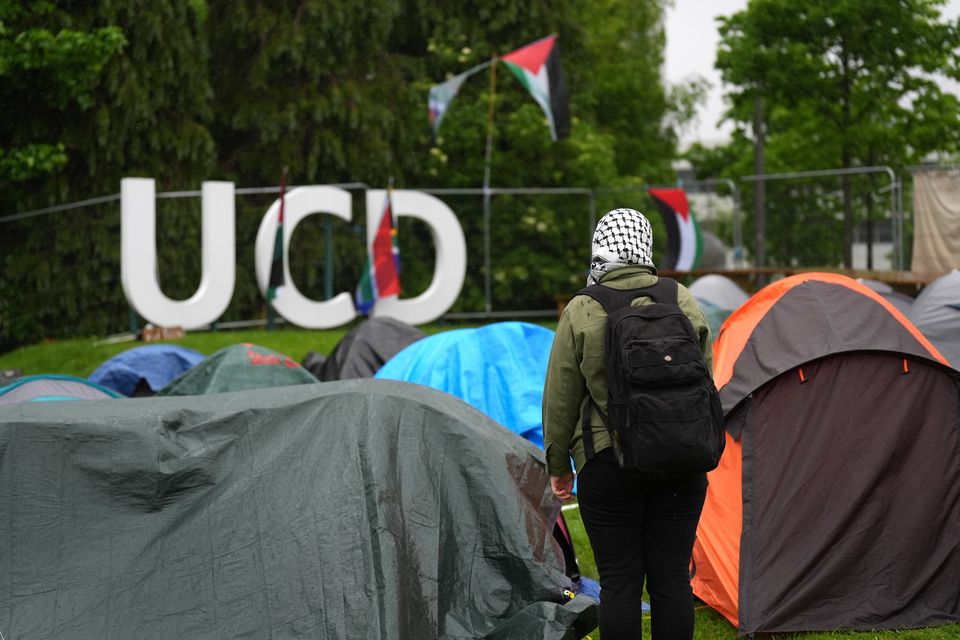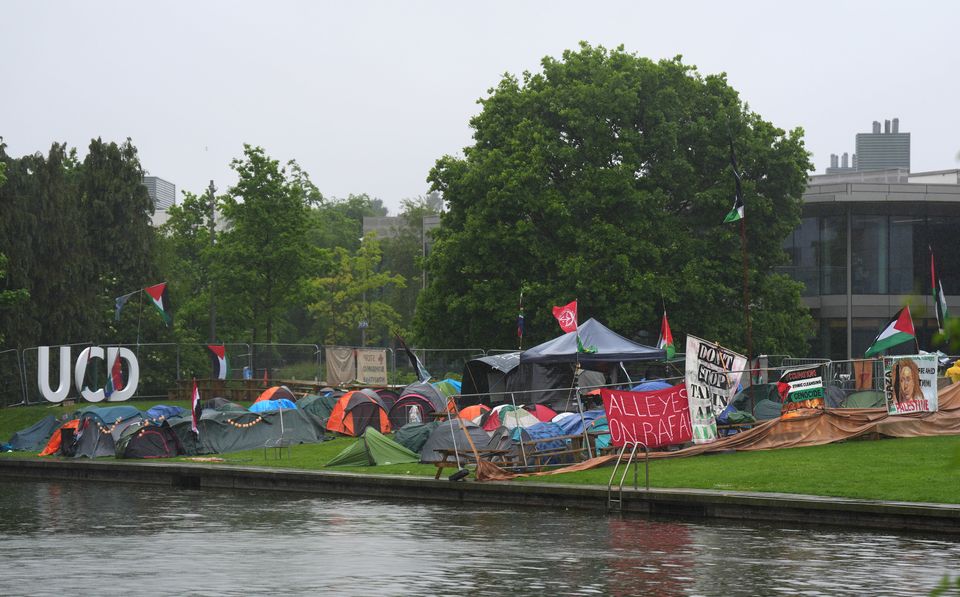“The Plan Is Genocide”: Palestine’s U.K. Ambassador Decries Israel’s Attack on Gaza & U.S. Complicity
STORY MAY 13, 2024
GUESTS Husam Zomlot
Palestinian ambassador to the United Kingdom.
Israel is intensifying its war across the Gaza Strip, with the official death toll now over 35,000, including more than 14,500 children. More than 360,000 Palestinians have now been displaced from Rafah as Israeli forces ramp up their attacks there despite warnings from the United States and others against an escalation in the southern city, where more than a million Palestinians had sought shelter. This comes as the United Nations General Assembly voted 143-9 on Friday in support of full membership for Palestine, with 25 countries abstaining. The measure grants new rights to privileges to Palestine, though it can’t become a full U.N. member without support from the Security Council, where the U.S. vetoed a Palestine statehood resolution last month. “The last seven months have unmasked, beyond doubt, many things, including the hypocrisy, selectivity, double standards of certain international actors, and I believe the U.S. administration is right at the top of that list,” says senior Palestinian diplomat Husam Zomlot, currently serving as ambassador to the United Kingdom. Zomlot also casts doubt on the claim Israel lacks clear goals in its assault on Gaza. “Israel does have a plan, and Israel is executing the plan with almost perfection. And the plan is genocide.”
Transcript
This is a rush transcript. Copy may not be in its final form.
AMY GOODMAN: This is Democracy Now!, democracynow.org, The War and Peace Report. I’m Amy Goodman.
Israel is intensifying its war across the Gaza Strip as the official death toll has now topped 35,000, including more than 14,500 children. According to the United Nations, more than 360,000 Palestinians have now been fled the southern city of Rafah despite fears there is nowhere safe to escape the Israeli bombardment.
This comes as the United Nations General Assembly voted 143 to 9 Friday in support of Palestine becoming a full U.N. member. Twenty-five countries abstained from the vote. The United States and Israel both voted against the measure. The vote grants new rights and privileges to Palestine, but it can’t become a full U.N. member without support from the U.N. Security Council. Last month, the U.S. vetoed a Palestine statehood resolution at the Security Council.
For more, we’re going to London to speak with the Palestinian ambassador to the United Kingdom, Husam Zomlot.
Welcome to Democracy Now!, Ambassador. Thanks so much for being with us. Let’s start in Gaza, with Israel intensifying the bombardment of Rafah, 360,000 Palestinians now moving out of Rafah, where so many of them had already fled to. Can you describe the situation on the ground? As we speak, we hear that the Kuwaiti Hospital has been ordered to evacuate, with staff saying they don’t want to leave their patients.
HUSAM ZOMLOT: There are no words, Amy, to describe the situation in Rafah, in Gaza. What is it? Horrific, Armageddon. I mean, people have been targeted for seven months. Some of them have had to leave five times, seven times, 10 times, including family members of mine. And I know what they have gone through, not only the displacement, not only the slaughterhouse that they have gone through, but there is nowhere to go. There is nowhere safe. Fathers, mothers are thinking about their children right now. I mean, it’s undescribable.
And it’s obvious Israel has decided to go on. They are not going to end this war without a serious pressure. And many are telling us, you know, Israel doesn’t have a military plan, Israel doesn’t have a political plan. Well, Israel does have a plan, and Israel is executing the plan with almost perfection. And the plan is genocide, and the plan is the mass expulsion of the Palestinians — a repeat of the Nakba of 1948, which we are commemorating this very month, in May. Otherwise, nothing of what Israel is doing makes sense. So, the situation is horrendous, horrendous in every sense of the word.
AMY GOODMAN: President Biden said he is withholding a shipment of weapons, bombs that could be used in Gaza, as the Rafah ground invasion is threatened. Your response to this, Ambassador? Do you feel that President Biden is shifting his position?
HUSAM ZOMLOT: Well, it’s a very important step, and it did break a taboo, a U.S. taboo. And we must build on this. But it is 100,000 people killed and maimed late, and we need to make sure that this is not just a pause, but this is an arms embargo, that the U.S. does fulfill its commitment under international law by making sure that its weapon does not end up in violation of international law. And it is absolutely, bluntly clear, particularly after the ruling of the International Court of Justice, that’s the highest court of the land, of the globe, a clear ruling whereby they officially put Israel on trial for genocide, ruling that it is plausible that Israel is committing genocide. And therefore, there is no conversation after that. Every third party that does provide Israel, genocidal Israel, with weapons, especially these 2,000-pound bombs that are not supposed to be used in civilian areas like Gaza, especially those, and many other weapons, we should see an arms embargo now.
And we should build on that step, that small step, taken by the U.S. president. And I assure you, if Netanyahu was certain that there will be an arms embargo, he wouldn’t have gone through Rafah. He wouldn’t have crossed that American red line. But he knows pressure in the U.S. by some of his allies will mount and that this pause in the shipment of these lethal weapons might actually resume soon.
AMY GOODMAN: We got word on Friday that the State Department had concluded Israel likely used U.S. weapons in violation of U.S. and international law, but the report claims the Biden administration has not yet found specific instances that could force the U.S. to withhold military aid. Your response, Ambassador?
HUSAM ZOMLOT: Well, I think the U.S. here is mincing their words, dodging any responsibility, delaying the inevitable, and not having the guts and the will, the political will, to do what is right. And this has been the story with the U.S. for a long time, for decades, Amy, and that’s why we are where we are today. The U.S. knows very well — the legal assessment is bluntly clear — Israel not only violated international law, Israel has bombed international law, has bombed the U.N. premises and what have you. And then, when Israel came up with these allegations against UNRWA, the U.S. was absolutely clear, or at least, you know, quick, to suspend funding from the organization that deals with the humanitarian side of Gaza, of the West Bank, of Palestinian refugees in general.
The U.S. policy vis-à-vis Palestine is inconsistent, contradictory. It does not make sense. It doesn’t add up. The U.S. has been saying for all along that it wants a two-state solution. And when we go to the U.N. seeking U.N. membership, you know, they veto it in the Security Council, and they vote against it in the General Assembly. And why? If you really believe in a two-state solution, why do you do so? Unless you really don’t, and all what you’re doing is just buying time, giving cover for Israel to finish off its job. This is very disingenuous on the part of the U.S. administration, extremely disingenuous, and very counterproductive. Because what’s the endgame? Israel will not be able to kill all Palestinians. They will not be able to finish us off. So, what’s the endgame with doing that? The U.S. says humanitarian catastrophe in Gaza, they want to see help, and then they still defund UNRWA and so forth. So, doesn’t make sense.
And I believe this is a moment when the last seven months have unmasked, beyond doubt, many things, including the hypocrisy, selectivity, double standards of certain international actors, and I believe the U.S. administration is right at the top of that list of not really being consistent with its own responsibilities as a founding member of the international legal system.
And we have been following some letters by senior U.S. officials and senators threatening the ICC, threatening judges, global judges, literally using words in their letters like “You have been warned.” You know, that reminds me, Amy, of The Sopranos, a Mafia-like threatening of courts, of international courts that we created after the horrors of the Second World War to make sure the “never again,” to make sure that everybody who commits war crimes is held accountable to international legality. You are threatening judges, imposing sanctions on international courts, on the ICC, only to shield a government and a military that is committing genocide and is on trial for genocide. And we are also following letters by also senators pressuring the U.S. president not to go ahead with the pause of the arms shipment to Israel.
And therefore, yes, this is a time when we are following everybody. We will not forget. We will not forget. We will not forget those who stood firm against the genocide, stood firm with international legality and international law, and those who are literally ransacking our humanity and ransacking our international system.
AMY GOODMAN: Ambassador Husam Zomlot, you’re joining us from London. You’re the Palestinian ambassador to Britain. The Foreign Office there is investigating a claim by Hamas that a British Israeli hostage, Nadav Popplewell, has died in Gaza, died about a month ago. Hamas has said that Nadav Popplewell succumbed to wounds from an Israeli airstrike about a month ago. His mother was released months ago. She was also a hostage. Can you tell us what you know at this point?
HUSAM ZOMLOT: I really don’t have information about this, Amy, whatsoever. But all loss of life is heartbreaking, regrettable. All hostages, from both sides, must be released and returned safely. And I repeat “from both sides,” because Israel has taken thousands of our people hostages, without trial, without charge. And you have followed some of the astonishing, heartbreaking reports of the Israeli treatment, Israeli prison guards’ treatment of our hostages, a CNN report only last week about the torture. And some of them have actually died under torture, like Dr. Adnan al-Bursh of Gaza, who is world-renowned for being a backbone of the health sector in Gaza. And once, he operated 41 operations in one day.
And therefore, you know, it is crucial to focus on what Israel has done to hospitals and to the health sector — of course, also to the education sector — I mean, destroying all and targeting the number of hospitals they did. And, you know, this is important, so people in the U.S., Amy, understand. In relative terms, in proportionate terms, if you apply the ratio of those killed and maimed, including children, if you apply the ratio in Gaza of schools, of hospitals to the U.S., let me give you some numbers. The people who have been killed and maimed in Gaza would make in the U.S. the equivalence — the equivalence of the same in the U.S. would be 14 million Americans killed and maimed. If it’s about only killed, it would be 5 million. If it’s about children, there would have been 2.1 million American children killed in the last seven months. About universities and hospitals, it would be 6,000 American universities destroyed, either in full or in part, would be 4,000 American hospitals targeted, destroyed, bombed. And it would be 105,000 schools in the U.S. damaged or completely destroyed.
So, this is the situation. And therefore, in Gaza, you have no way to treat anybody. And the situation has become exactly in line with the original plan, the blueprint of Netanyahu and Israel: lifeless, a place that you cannot live in. And even if you want to move within it, you have no home to go back to, you have no school to send your children and kids to, you have no hospitals to be treated in — a lifeless territory for the final push of people out of their homeland.
AMY GOODMAN: I want to ask you about the United Nations General Assembly vote, 143 to 9 Friday in support of Palestinian statehood — Palestine becoming a full U.N. member. Twenty-five countries abstained. U.S. and Israel both voted against the measure. The vote grants new rights and privileges to Palestine, but not full U.N. membership, which requires the support of the U.N. Security Council. Last month, the U.S. vetoed a Palestine statehood resolution at the Security Council. Can you respond?
HUSAM ZOMLOT: Yes. That tells you the contrast. On the one hand, you have the overwhelming majority of the world in support of Palestinian rights, the right to self-determination, our right to have a state status in the U.N., a member state in the U.N., 143 countries. And on the other hand, you have the U.S. standing almost alone against that, together with Israel and a couple of other smaller countries, being isolated. And the U.S. is going out of its way always to shield Israel — and to prevent its own policy. I mean, it’s so telling. It’s so telling.
You know, that vote and that speech by the Israeli representative, that shredding of the U.N. Charter, what was he objecting? What was the Israeli representative objecting? What was the U.S. objecting? Was it objecting to Hamas? Was it objecting to violence? Was it objecting to — no, Israel was and is and has been objecting to the creation of a Palestinian state. That’s the objection. The rest is details. The rest is symptoms. And that objection, that block of our right to self-determination, our right to sovereignty and independence, our right and our duty to liberate our land and live in a state of our own, is the heart of the matter. That’s the root cause. And why would the U.S. object to that? And then, the whole thing becomes about certain periods of our history: 7th of October, Second Intifada, First Intifada. That’s the key part. And I believe that moment has revealed much.
And I think I can confirm for you that we will build on that historic moment. We must thank all the nations that have come in support of the state of Palestine and its status in the U.N. And we will come back. We will come back to the Security Council. We will come back to the General Assembly. We will come back every session, if needed, every time, every day, until we are admitted as a U.N., because the majority of the world have spoken, because Palestine has the right, meets the criteria of the U.N. Charter for membership. And the U.S. has no right and has no business — the United States and the administration of the U.S. has no right and has no business of objecting to Palestinian right to self-determination. They don’t. And they must stop that.
AMY GOODMAN: Ambassador Husam Zomlot, we want to thank you very much for being with us, Palestinian ambassador to the United Kingdom. Interestingly, the speech of the U.S. ambassador to the United Nations was canceled, to Linda Thomas-Greenfield, both to — and also invitations withdrawn by Xavier University and University of Vermont because of student objections to American support for Israel. President Biden is expected to address Morehouse, the historically Black college, next weekend, and there’s rising protest around that address.
This is viewer supported news. Please do your part today.DONATE
This is Democracy Now! Coming up next, Ben Crump. A Florida airman is killed by police. I’m Amy Goodman.






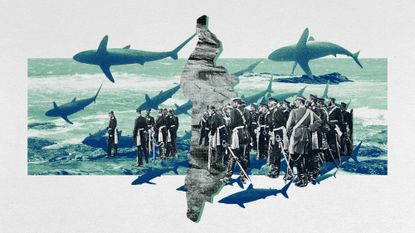
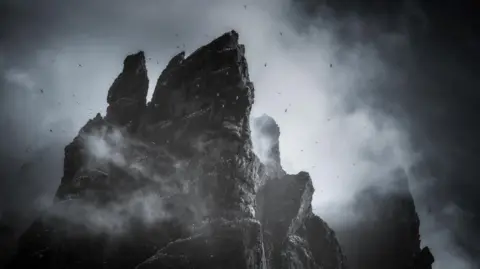
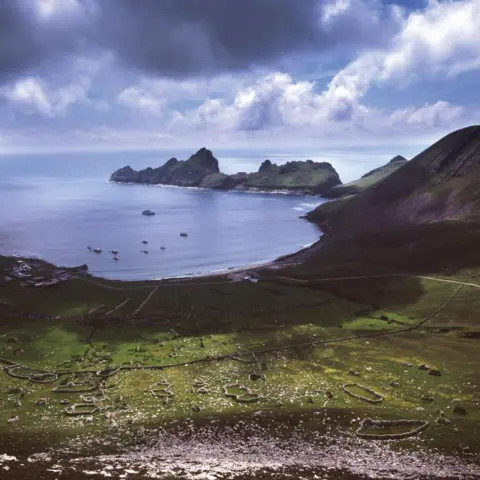

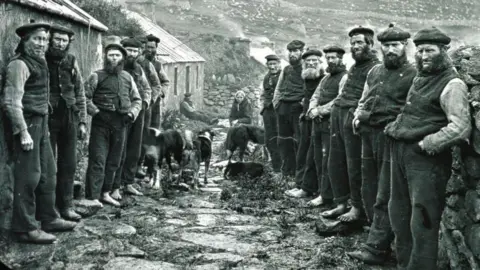
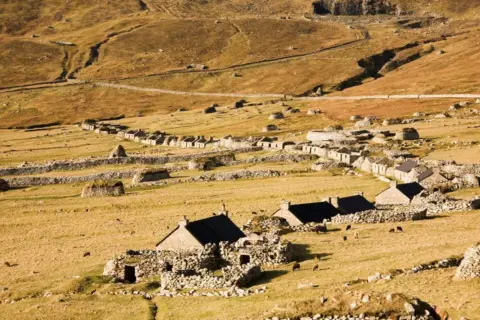
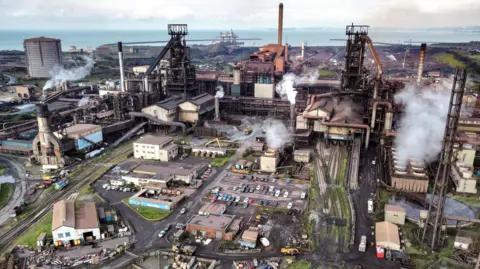
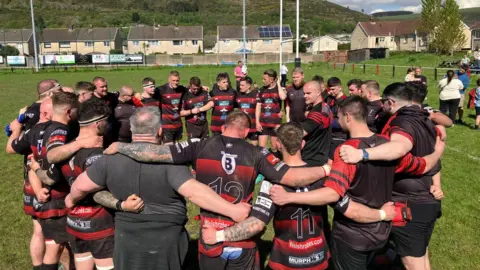
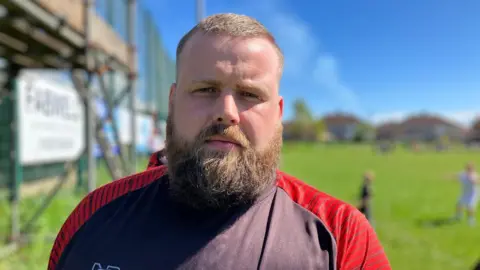
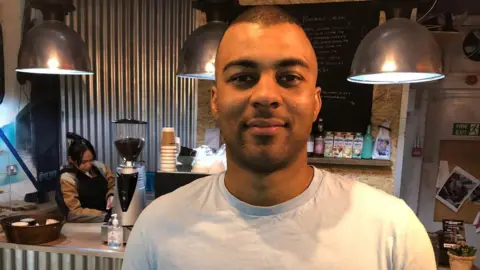
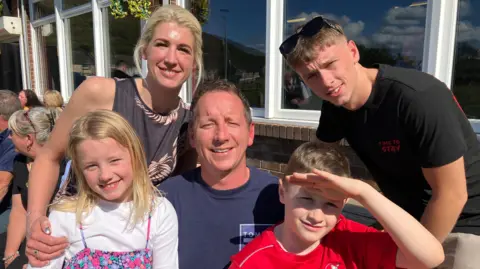
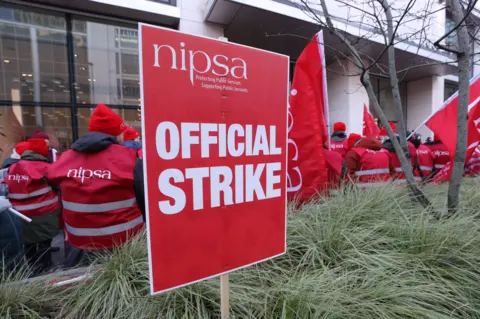 PA
PA